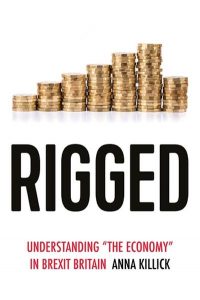In Rigged: Understanding ‘The Economy’ in Brexit Britain, Anna Killick offers a new ethnographic study conducted in the aftermath of the Brexit referendum that explores what people from a range of backgrounds mean when they talk about ‘the economy’, with respondents discussing their employment, beliefs about debt, trade and migration and their perceptions of the economy overall. This book is highly recommended to anyone interested in developing a deeper understanding of the economy’s conceptual underpinnings and the tensions that Brexit has brought to the surface, writes Jack Mosse.
Rigged: Understanding ‘The Economy’ in Brexit Britain. Anna Killick. Manchester University Press. 2020.

Analysis of support for Brexit, just like analysis of Donald Trump’s rise to power, has tended to explore whether or not people voted the way they did for economic or cultural reasons. Were the ‘left behind’ motivated by worsening economic conditions or by a ‘cultural backlash’ against immigration and the multicultural values of globalisation?
Anna Killick’s Rigged problematises this distinction. She argues that before we can talk about ‘culture’ on one side and ‘the economy’ on the other, we must first work out what people mean by ‘the economy’. The effect this has is to blur the lines between the two. Through her insightful ethnographic study, we see how the distinction between culture and the economy, rather than being a helpful analytical tool, is one that serves political ends.
Killick’s study has gained added relevance in recent months. If ‘the economy’ was pitted against ‘culture’ in the form of nationalism/nativism in 2016, in 2020 it was pitted against public health. The policy response to COVID-19 has been framed as a trade-off between the nation’s health on the one hand, and the nation’s economy on the other. In both frameworks, the economy acts as a well-rounded and stable signifier. But what exactly does it signify?
Following other authors such as Timothy Mitchell, Killick argues that the now dominant notion of the economy as a distinct sphere (separated out from other human endeavours like politics and society) originated in the Enlightenment but took root in the twentieth century. Scientific laws were developed from which models could be constructed, and experts (economists) were needed to understand this newly discovered aspect of our world (the economy). The notion of the economy as a separate sphere received a significant shot in the arm during the Margaret Thatcher/Ronald Reagan era, and now dominates what Killick calls the ‘formal economy’. By this she means the manner in which politicians, the media and political scientists have come to use the term to denote an objectively governed impersonal sphere that is disconnected from other social (or cultural) behaviour.

Killick argues that this vision of the economy forms the conceptual underpinning of the current neoliberal settlement. Broadly put, markets are understood as being in line with the fundamentals of human nature and, as such, are based on objective laws. Therefore, the market economy can be modelled and studied as an objective phenomenon deriving from these basic laws. While reifying the economy, this formal vision also naturalises markets as the only form of economic organisation that is in line with our basic nature. Fixing ‘the economy’ as a term that refers to an objective and bounded sphere of human behaviour in this manner aids the promotion of markets and shuts out any conceivable alternative.
In outlining this argument, Rigged weighs in on two long-running debates. Firstly, the economy versus culture as a framework for understanding political behaviour. And secondly, the conceptual foundations of neoliberalism.
These broader theoretical debates frame and bookend Killick’s ethnography, which unfolds chapter by chapter on a thematic basis. Killick spent a number of years talking to residents of a city on the south coast of England about the economy. The interviews were conducted in the aftermath of the UK referendum on EU membership, and Brexit looms large in the conversations. Killick focuses on two contrasting areas of the city, a high-income area and a low-income area, and her respondents talk about their employment, beliefs about debt, trade and migration and their perceptions of the economy overall.
Bluntly put, and without a fraction of the nuance present in the study, Killick’s research indicates that people in the Remain-voting, wealthy, ‘Church District’ by and large conform to the formal economy view – seeing the economy as a disembedded, objectively governed, impersonal sphere. Whereas participants from the poorer, Leave-voting, ‘Hill District’ tended to see the economy as rigged, as a sham – a system organised for the rich by the rich.
Killick convincingly argues that the reasons behind these two varying conceptions of the economy stem from the varying economic experiences of each set of participants. By linking this finding to the Brexit referendum, she draws into question the popular frame that poorer Leave voters voted the way they did due to cultural (read: xenophobic) bias, whereas Remain voters (who tend to subscribe to the formal economy view of things) voted the way they did based on the sound principles of economic rationality. Instead, both groups are seen to be motivated by complex and irreducible bricolages of cultural and economic beliefs and experiences.
Immigration is where the Brexit battle was at its most fierce, and this is where Killick’s argument is sharpest. It brings out the basic point that while immigration may be good for Gross Domestic Product (GDP) and for overall job creation (and therefore good for the formal economy), it has often been experienced negatively by people working in low-skilled sectors. ‘Hill District’ respondents frequently tell Killick that their wages, job conditions and access to council housing have deteriorated during the period of free movement and the arrival of many mainland Europeans to the city. Killick reflects on the empirical backing for this view, noting that there are some studies into the impact of immigration on occupational wages for different sectors that agree with this premise, although the general economic consensus is that migration benefits wages overall.
As such, the formal economy perspective is shown to smother competing visions of the economy that take into account the lived experiences of different marginalised groups. And this brings us back to the book’s broader theme – the picture that the term economy ‘paints in our minds’ when we hear it. GDP and employment figures are cold, objective, formal economy terms. But these words offer nothing of the lived experience of people’s lives. Details like who suffers and who benefits from an economic system are ironed out in the formal economy perspective as its focus on blanket issues like GDP, unemployment or inflation offer nothing of how these factors impact different sections of society. As such, experiential aspects are unaccounted for in the formal perspective, such as: how is GDP growing, and what are the implications for different groups? What type of employment is being created/undermined? Where is inflation happening and who is it impacting upon?
The book, therefore, acts as a welcome wake-up call and a warning: if we do not start to understand the economy from a humanistic perspective, one that incorporates different people’s lived realities, then the social chasms that have characterised the last five years will continue to widen, both in material and cultural terms.
Rigged is not new in showing how the categories of culture and the economy are difficult to keep separate – this is the position taken by most social researchers – but it is novel in exploring how people actually see ‘the economy’ and understand it as a term. It brings the debate to life at a critical time. COVID-19 has seen the state vastly expand its influence and spending, as it is forced to prop up a private sector in disarray. This shift has made different visions of the economy possible.
The type of economy that emerges from the rubble of the COVID-19 crisis will depend on whether or not the formal economy vision maintains its grasp, or if it can be swept aside by a more humanistic understanding. Rigged offers some hope that the tide might be turning as it dissects the notion of the economy as an impersonal sphere and, through its interviews, indicates that many people may be willing to adopt a different approach.
Rigged is based on an original ethnography and the theoretical arguments it posits, based on the findings, are by necessity speculative. Some readers may find the level of detail included in Killick’s discussion of her methodological approach and in the ethnography itself a little burdensome and desire a smoother and clearer link between the empirical study and the theory. However, other than this minor stylistic quibble, I would highly recommend Rigged to anyone interested in developing a deeper understanding of our economy’s conceptual underpinning, and of the underlying tensions that Brexit has brought to the surface.
Note: This review gives the views of the author, and not the position of the LSE Review of Books blog, or of the London School of Economics.
Image Credit: Photo by Josh Appel on Unsplash.







